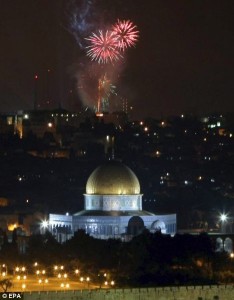 So much of the angst between Israeli and Palestinian sides has been centered around finger pointing. We find it easier to tell the other side what it must do before peace can come. We put the onus on them, we remain ready to go, with no hard decisions to make. So Netanyahu digs his heels in. And Abbas likewise takes an intractable stand.
So much of the angst between Israeli and Palestinian sides has been centered around finger pointing. We find it easier to tell the other side what it must do before peace can come. We put the onus on them, we remain ready to go, with no hard decisions to make. So Netanyahu digs his heels in. And Abbas likewise takes an intractable stand.
Those of us who advocate for a two state solution speak of our ability to control only what happens on our side. We talk about the things that we can do to create space for peace or even unilateral moves to achieve peace. We continually call upon the Israeli government to take proactive steps regarding restarting peace talks and settlements. But realistically that is not enough.
The truth remains that peace can only come when both sides are prepared to make the difficult and courageous choices which include concessions neither want to make. But they both are compelled to make these compromises in order to create the greater good of peace for all. Leadership must be prepared to truly be visionaries and take bold steps.
So Mr. Abbas, your people, the world and your potential ally Israel are watching current events and your responses very closely. We hear your silence when youngsters brutally attack with knives and deliberately place themselves in harms way in a futile and desperate attempt to incite and murder. We hear your voice fanning the flames of hate with falsehoods playing on the emotions of the Moslem faithful regarding the Temple Mount/al-Haram al-Sarif/Har Habayit and the purposeful false report of the death of a 13-year-old. Through these things, you clearly tell us where you stand as the leader of the Palestinians and on the opportunity for peace. You appear to have turned your back on your people. You are willing to make them a nation of perpetual martyrs, permanently disenfranchised with no hope of a homeland, only the fantasy of victorious war over Israel.
It is time to make Israel your ally. She is both legitimate and permanent. So the choice is yours. A never-ending battle using your people as pawns or the creation of a viable peace between two nations living cooperatively. Ultimately perhaps your goal might be to someday stand like Ronald Reagan and declare it is the time for the Security wall to come down. And in an era of peace, your Israeli counterpart will be all too likely to comply.
